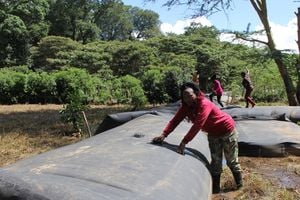The upbringing that fomented the killing of SA model

Oscar Pistorius (left) at the High Court in Pretoria on March 10, 2014. The sprinter was charged with the murder of his girlfriend Reeva Steenkamp (right).
What you need to know:
- The extended family of Paralympic gold medallist and Olympian Oscar Pistorius owned 55 firearms and Oscar often visited a gun range, hitting his practice targets with 86 per cent accuracy.
- On Valentine’s Day 2013, Pistorius fired four shots from his automatic nine-millimetre Parabellum pistol, through his bathroom door, three striking his 29-year old girlfriend Reeva Steenkamp.
At 3.14am on Valentine’s Day 2013, Paralympic gold medallist and Olympian Oscar Pistorius, also known as the 'Blade Runner' for his prosthetic legs, fired four shots from his automatic nine-millimetre Parabellum pistol, through his bathroom door.
Three of the shots struck his 29-year-old girlfriend, Reeva Steenkamp: one in the hip, the other in the right arm, and a fatal shot in the head.
His home was on Silver Woods Estate, a heavily guarded suburb in the eastern residential part of Pretoria, the administrative capital of South Africa.
Pistorius was then 26, and internationally renowned as the first disabled athlete to compete in the Olympic Games, earning himself the epithet ‘the fastest man with no legs’.
In Chase Your Shadow: The Trials of Oscar Pistorius, author John Carlin states that the aspersions cast on Oscar’s story were dominated by scepticism. Oscar insisted inconclusively that he suspected an intruder was locked in his lavatory.
Guns were a strong passion of Oscar’s Afrikaner heritage. His father, Henke Pistorius, had lived in the wealthy suburb of Constantia Kloof, Johannesburg, 40 miles south of Pretoria.
Like most white South Africans, he was proud of the Afrikaner trekkers December 1893 victorious conflict, where a 470-gun wielding Afrikaner army defeated 10,000 Zulu warriors armed only with spears.
The extended Pistorius family owned 55 guns and Oscar often visited a gun range, hitting his practice targets with 86 per cent accuracy. Henke and Sheila (Pistorius's mother) divorced when he was six years old.
Sheila struggled in anguish as a single mother, raising Oscar and his siblings, Aimée and Carl, with barely enough cash flow. She was the centre of Oscar’s childhood universe, instilling in him the conviction that he could accomplish his dreams, despite his legs having been amputated.
Sheila was terrified of crime and lived in agitation of an intruder breaking into her home. When Henke left, the family moved to a smaller home in a rougher neighbourhood. There were several break-ins, to which Sheila responded by taking an extreme precaution of sleeping with a loaded pistol under her pillow.
Oscar fell prey to the mortified terror-driven panic and hysteria Sheila had implanted into his subconscious mind, and as an adult, he would sleep with a gun tucked under his bed.

The cover of the book, The Trials of Oscar Pistorius: Chase Your Shadow.
Sheila also battled with an inner grief from her divorce that led her to solitary drinking, often intending to sleep. Her addiction led to a liver complication.
On March 6, 2002, when Oscar was 15, his mother died. Henke had relocated to the coastal city of Port Elizabeth (PE), 700 miles southeast of Johannesburg, after their divorce.
Coincidentally, PE is where Reeva grew up. She was born on August 19, 1983, in the lively Cape Town. Her family relocated to a middle-class residential area known as Miramar in PE.
Reeva’s immediate ambition was to study law. Her parents couldn’t afford her university fees, but she sank into her studies and attained a bursary, completing her degree at Port Elizabeth’s Nelson Mandela University in 2005, when she was 22.
However, her passion was modelling, and her determination led her to sign a contract with Ice Model agency, after moving to Jo'burg. Reeva’s first break came a year later when she was hired by cosmetics company Avon South Africa.
Regrettably, she fell while riding a horse and broke her back, crushing her vertebrae. Doctors were uncertain if she would walk again.
Six weeks later, she recovered fully and was employed by Fashion TV South Africa. In October 2008, she was alone at home with her mother, June, when thieves stormed in.
As they ransacked their home, Reeva and June hid for 15 minutes inside a locked room, silent and frozen in trepidation.
By 2010, Reeva began appearing in adverts for Toyota, Pin Pop lollipops, Cardinal Beer and Hollywood chewing gum.
In 2011, she was on the cover of FHM magazine and in the middle of 2012, she was invited to fly to Jamaica to appear in South African reality show Tropika Island of Treasure, which was broadcast two days after her death.
Oscar's accomplished friend, Justin Divaris, owned South Africa's consummate dealership for Rolls-Royce, McLaren and Aston Martin.
He often recruited models, including Reeva, to pose next to his top-of-the-range cars during multinational car shows and on November 4, 2012, on the Kyalami motor-racing track, halfway between Pretoria and Jo'burg, Divaris introduced Reeva to the man who would eventually kill her.
Oscar often went on shooting expeditions and used expanding bullets, known colloquially as dumdum bullets, on watermelons. He was mesmerised by how the melons would implode when hit.
Unlike conventional bullets that simply penetrate targets, dumdum bullets expand on impact, causing extensive indentation and inflicting larger wounds with more tissue damage.
On February 14, 2013, the Dumdum bullets were still in Oscar’s cartridge in his automatic pistol under his bed. When one of the bullets hit Reeva’s head, she had no chance of survival.
On October 21, 2014, Oscar was sentenced to five years in prison for culpable homicide for Reeva’s murder.
The writer is a novelist, Big Brother Africa 2 Kenyan representative and founder of Jeff's Fitness Center (@jeffbigbrother).





